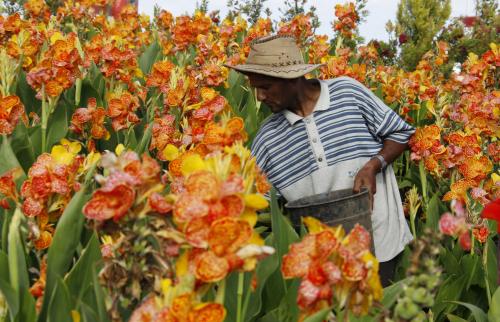Two years after the revolution that swept away a 60-year-old autocratic system, Egypt needs a new economic vision based on more inclusive growth and greater social justice. Economic policies before the revolution achieved high growth, but they failed to be inclusive as they left about 45 million Egyptians trapped in lower middle class status living on $2-$4 a day and provided few opportunities for youth who felt economically and socially excluded. Inclusiveness would require a more participatory decision-making process, as well as a shift away from a system of crony capitalism to one that focuses on developing small businesses and on creating more opportunities for young men and women. The government is currently under pressure to adopt measures to stabilize the economy. Articulating a vision for future growth with social justice, and taking steps to implement it, could make such measures more acceptable to the majority of Egyptians.
Taking difficult stabilization measures is necessary because Egypt is facing a macroeconomic crisis. The fiscal deficit is about 12 percent of GDP, the public debt has ballooned to 80 percent of GDP, international reserves barely cover three months of imports and the Egyptian pound is under increasing pressure. As a result investment and growth are down, unemployment is up, prices of basic necessities are rising, and fuel shortages and electricity blackouts are common occurrences. Egyptians are worse off than they were two years ago. They have been patient, and have accepted temporary economic hardship as the price of freedom and democracy. But how long will this patience last?
Dealing with the current crisis will most likely require additional sacrifices. Government will probably have to reduce subsidies and the Egyptian pound may continue to depreciate. Prices of many necessities would rise further, hurting the poor and the middle class. In order to stabilize the economy, and reach an agreement with the International Monetary Fund, the government announced in December 2012 a series of measures to reduce subsidies and increase taxes, but it rescinded them the very next day out of fear of popular unrest at a time of heightened tensions surrounding the adoption of a new constitution. However, difficult macroeconomic decisions cannot be postponed indefinitely, and the government has launched a “societal dialogue” to explain the proposed measures and gain support for them.
Launching a broad dialogue on economic issues is a positive development, but this dialogue needs to be well-organized and institutionalized. Before the revolution Egypt lagged behind the rest of the world on nearly all governance indicators, particularly those related to voice and participation. Therefore, there is a need to develop new mechanisms to broaden participation in economic decision-making. Experiences of Japan, Malaysia and Indonesia indicate the importance of achieving a national consensus on an economic vision for the future, and the policies and programs needed to achieve it. Successful East Asian countries have put in place consultative processes (including different government departments, the private sector and civil society) to agree on national development plans and monitor their execution. A recent Brookings research paper by Kei Sakamoto adapts the experiences of East Asia to Egypt’s situation, and presents a proposal for introducing the concept of “inclusive planning” in Egypt.
A dialogue that focuses exclusively on macro-stabilization may not attract the kind of support that the government needs. Stabilization should be viewed as a step towards the resumption of growth. Better living standards, human dignity and social justice were key demands of the revolution. Government needs to launch a discussion of how those demands would be met, and why stabilization is necessary to meeting them. A strategy to achieve inclusive growth and social justice could be one of the outcomes of such a dialogue.
Programs to encourage youth entrepreneurship and develop small businesses should be part of such an inclusive growth strategy. It has become increasingly hard for educated young people to find jobs, and youth with secondary education or above represent about 95 percent of the unemployed in Egypt. The problem is particularly acute for young women who are 3.8 times more likely to be unemployed than young men. Of the young men and women who do find jobs, only 28 percent find formal sector jobs—18 percent in the public sector and 10 percent in the formal private sector. The vast majority, 72 percent, end up working in the informal micro and small enterprise sector, often as unpaid family workers. For those who are paid, many have no labor contract, no job security or social benefits. Therefore, it seems quite clear that policies and programs that aim at expanding and modernizing small business, and encouraging educated youth to start their own enterprises would have a significant impact on employment, and would contribute to growth and social justice. In a recent Brookings research paper I present some proposals on how to develop small businesses and youth entrepreneurship in Egypt.
For two years now economic issues have been put on the back burner as Egyptians focused on politics and questions of religion and national identity. As a result, the economic situation has seriously deteriorated and aspirations for better living standards and greater equity are far from being met. This could ultimately jeopardize the democratic transition. Government’s decision to launch a broad economic dialogue is positive. This dialogue needs to be institutionalized and extended beyond stabilization to include strategies to achieve inclusive growth.


Commentary
Two Years After the Egyptian Revolution: A Vision for Inclusive Growth Is Needed
January 25, 2013